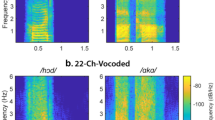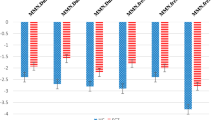Summary
Auditory event-related potentials (ERPs) during a syllable discrimination task were recorded from 15 patients suffering from methamphetamine (MAP) psychosis after the remission of acute psychotic symptoms, and from 15 normal age-matched controls. Subjects were instructed to press a button in response to the target syllables applied to one designated ear. In MAP psychotics, the attention-related negative components (Nd) area was reduced and P300 latency was delayed compared with normal controls. MAP psychotics and controls did not differ significantly in P300 amplitude. These findings suggest that MAP psychotics show some impairment in the auditory information processing.
Similar content being viewed by others
References
Angrist B, Sudilovsky A (1978) Central nervous system stimulants. 3. Amphetamine and methamphetamine. In: Iversen LL, Iversen SD, Snyder SH (eds) Handbook of psychopharmacology Vol. 11. Plenum Press, New York, pp 111–123
Angrist B, van Kammen DP (1984) CNS stimulants as tools in the study of schizophrenia. Trends Neurosci 7:388–390
Baribeau-Braun J, Picton TW, Gosselin J (1983) Schizophrenia: A neuropsychological evaluation of abnormal information processing. Science 219:874–876
Connell PH (1958) Amphetamine psychosis. Chapman and Hall, London
Davis JM (1976) Comparative doses and costs of antipsychotic medication. Arch Gen Psychiatry 33:858–861
Donchin E, Coles MGH (1988) Is the P300 component a manifestation of context updating? Behav Brain Sci 11:357–374
Fujimori A, Nakatani Y, Sakaguchi M (1989) Ein Beitrag zur Kenntnis klinischer Verläufe von chronischen Methamphetamin-Psychosen. Fortschr Neurol Psychiatr 57:383–394
Grinspoon L, Bakalar JB (1985) Drug dependence. Amphetamines. In: Kaplan HI, Sadock BJ (eds) Comprehensive textbook of psychiatry. ed. 4. Williams and Wilkins, Baltimore, pp 1619–1621
Hillyard SA, Kutas M (1983) Electrophysiology of cognitive processing. Annu Rev Psychol 34:44–61
Iwanami A, Kato N, Nakatani Y (1991) P300 in methamphetamine psychosis. Biol Psychiatry 1991 30:726–730
Kameyama T, Niwa S, Hiramatsu K, Saitoh O, Fukuda M, Nakagome K, Itoh K (1987) Event-related potential correlates of psychotropic drug effects on attentional and hemispheric-dysfunction in schizophrenia. In: Takahashi R, Flor-Henry R, Gruzelier J, Niwa S (eds) Cerebral dynamics: Laterality and psychopathology. Elsevier, Amsterdam, pp 221–230
Kutas M, McCarthy G, Donchin E (1977) Augmenting mental chronometry: The P300 as a measure of stimulus evaluation time. Science 197:792–795
Kutcher SP, Blackwood DHR, St Clair D, Gaskell DF, Muir WJ (1987) Auditory P300 in borderline personality disorder and schizophrenia. Arch Gen Psychiatry 44:645–650
Michie PT, Fox AM, Ward PB, Catts SV, McConaghy N (1991) Event-related indices of selective attention and cortical lateralization in schizophrenia. Psychophysiology 27:209–227
Näätänen R (1982) Processing negativity. An evoked-potential reflection of selective attention. Psychol Bull 192:605–640
Nakatani Y, Yoshizawa J, Yamada H, Iwanami A, Sakaguchi M, Kato N (1989) Methamphetamine psychosis in Japan: a survey. Br J Addict 84:1548–1549
Phefferbaum A, Ford JM, White PM, Roth WT (1989) P3 in schizophrenia is affected by stimulus modality, response requirements, medication status, and negative symptoms. Arch Gen Psychiatry 6:1035–1044
Pritchard WS (1986) Cognitive event-related potentials in schizophrenics. Psychol Bull 100:43–66
Saitoh O, Niwa S, Hiramatsu K, Kameyama T, Rymar K, Itoh K (1984) Abnormalities in late positive components of eventrelated potentials may reflect a genetic predisposition to schizophrenia. Biol Psychiatry 19:293–303
Sato M, Chen CC, Akiyama K, Otsuki S (1983) Acute exacerbation of paranoid psychotic state after long-term abstinence in patients with previous methamphetamine psychosis. Biol Psychiatry 18:429–440
Snyder SH (1973) Amphetamine psychosis. A “Model” schizophrenia mediated by catecholamines. Am J Psychiatry 130: 61–67
Sutton S, Braren M, Zubin J, John ER (1965) Evoked potential correlates of uncertainty. Science 150:1187–1188
Tatetsu S (1963) Methamphetamine psychosis. Folia Psychiatr Neurol Japan Suppl 7:377–380
Author information
Authors and Affiliations
Rights and permissions
About this article
Cite this article
Iwanami, A., Suga, I., Kato, N. et al. Event-related potentials in methamphetamine psychosis during an auditory discrimination task. Eur Arch Psychiatry Clin Nuerosci 242, 203–208 (1993). https://doi.org/10.1007/BF02189964
Received:
Issue Date:
DOI: https://doi.org/10.1007/BF02189964




